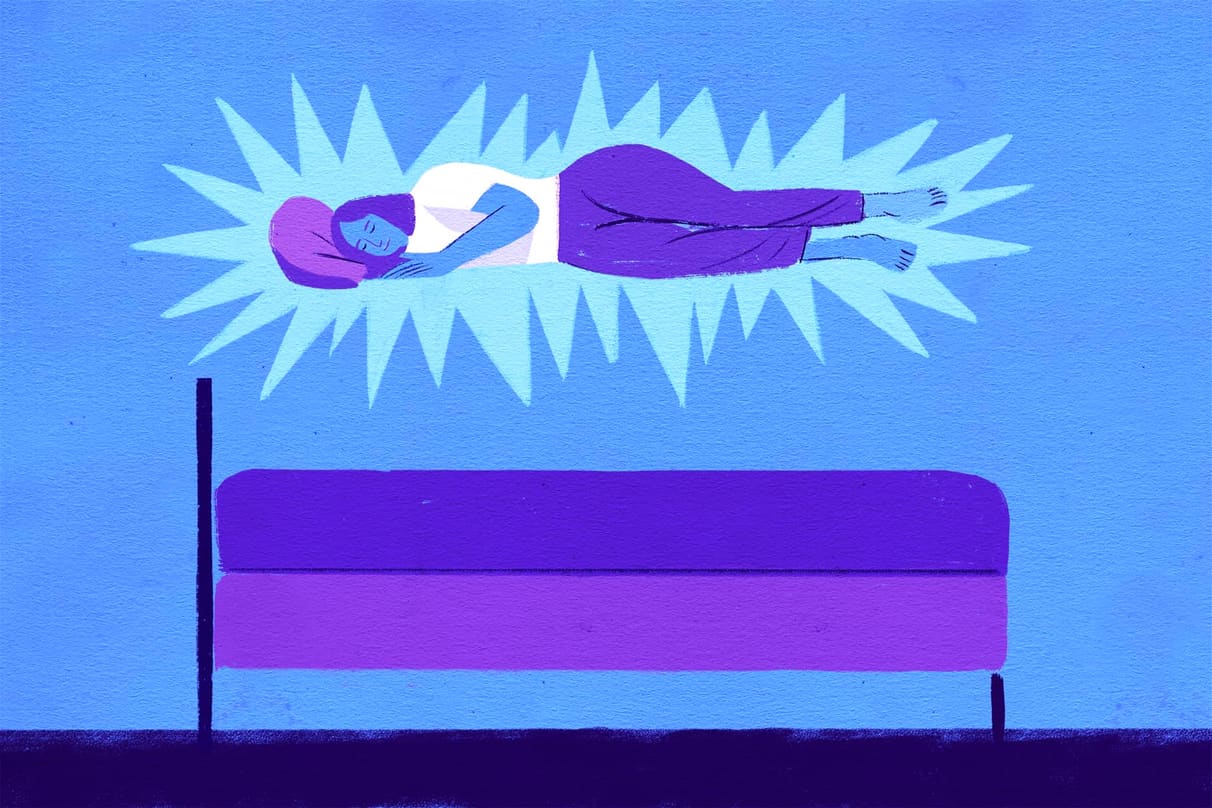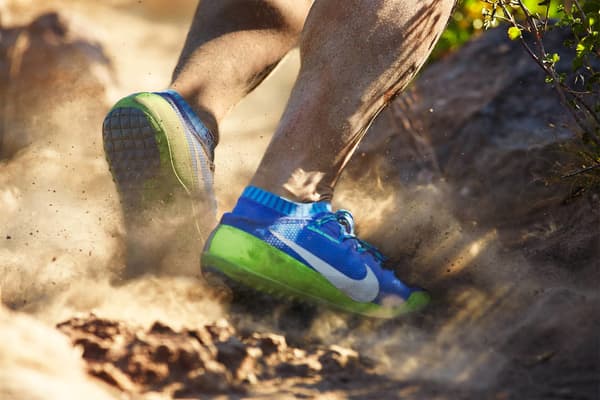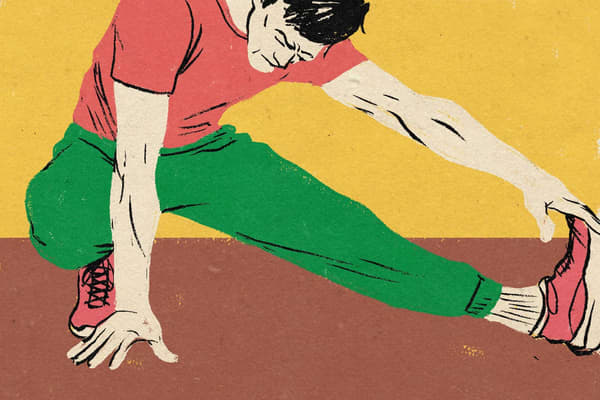Why Is Sleep So Important for Athletic Recovery? Experts Explain
Health & Wellness
If you're looking to boost your performance, consider focusing just as much on your sleep routine as you do on your workouts.

When it comes to athletic recovery strategies, there are a breadth of tactics that can make a difference, including adjusting your nutritional macros, dry needling, getting a deep-tissue massage, and taking a rest day. But there's one recovery method you already do, naturally, that makes a huge difference: sleep.
(Related: Why Self-Massage Is the Ultimate Pre-workout Method)
Why Is Sleep Important?

A research review, found in a 2019 issue of the International Journal of Sports Medicine, noted that sleep is critical to overall health, and that includes athletic performance. Researchers suggested that sleep deprivation could lead to reduced reaction time, less strength and endurance, and even lower mood and less energy.
Another analysis, published as a consensus statement from sports medicine experts in a 2021 issue of the British Journal of Sports Medicine, noted that elite athletes are particularly susceptible to sleep shortfalls, including getting too little sleep in general and having disrupted sleep when they do manage to get some shuteye, due to factors such as travel, competition start times, and injuries. The authors of the paper added that previous research on a wider population, not just athletes, showed that poor sleep is associated with other health risks, including higher risk of respiratory infection and heart issues.
For example, a study in a 2022 issue of the Journal of the American Heart Association concluded that too little — and also too much — sleep, as well as poor sleep patterns, are linked to an increased risk of cardiovascular disease. Other studies have suggested sleep quality influences a range of other factors, too, including immune system response, ability to regulate blood sugar effectively, and chances that you'll have good gut health.
(Related: How Proper Sleep Hygiene Can Improve Your Athletic Performance)
All of these can contribute to how well you recover from a workout, said Chris Winter, M.D. and president of Charlottesville Neurology and Sleep Medicine. That doesn't just mean how refreshed you feel the next time you exercise, but how boosted you seem in other ways as well, including mental and physical energy.
"It's not just a matter of getting a good night's sleep and then you perform better the next day," he said. "While that might be the case, sleep quality could be affecting you in more ways than you realize, and that informs not just your training recovery, but possibly nearly every other aspect of your health as well."
Why Sleep Helps Recovery

When you sleep, and especially when you're in deep sleep, the body performs repair work that can’t be done when you're active, Winter said. For example, he noted that your pituitary gland releases growth hormone, used to build new muscle fiber and fix damaged muscle tissue. This is why you may hear health experts and personal trainers say you can't increase muscle size and strength through training alone. Instead, muscles get stronger from being repaired after a workout. Without adequate recovery, that process will fall short and you may end up with more muscle damage and inflammation due to overtraining.
Another important aspect of recovery is stress reduction, Winter said. Exercise produces a certain level of physical and mental stress. De-stressing tactics done during the day are helpful, but the central nervous system, or CNS, achieves its highest level of “chilling out” through sleep, he said. In other words, a good night’s rest acts as a reset for the CNS, and reduces the potentially negative effects of chronic stress, Winter said.
The Sleep-Recovery Connection

Although sleep can aid in recovery, which may improve athletic performance overall, it isn't a one-way relationship. Research indicates that regular exercise such as strength training can result in improved sleep quality.
(Related: Can’t Sleep? Here’s What Experts Say To Do)
Implementing strength training into your weekly routine can create a beneficial cycle, according to sleep and exercise researcher Jason Bennie, Ph.D. and associate professor in physical activity epidemiology at University of Southern Queensland in Australia. In other words, consistent exercise improves sleep, and better sleep improves exercise, creating a mutually advantageous relationship that builds on each other.
For example, Bennie was the lead author on a study of more than 23,000 adults, which was published in a 2020 issue of Preventive Medicine Reports, that found any degree of resistance training (no matter the frequency or intensity) boosted sleep quality — even for those with a history of insomnia. A notable aspect of that research, Bennie said, was the range of participants, which included both men and women, ages 18 to those over 65.
"Considering the large population sample we used, there's compelling evidence that this connection is true for everyone, no matter who you are or how old you are," Bennie said, adding that there may be several reasons for the strength of this link between resistance training and improved sleep. This includes better heart rate variability and blood pressure, as well as optimized glucose and cholesterol regulation — which have all been shown to benefit from quality sleep and regular exercise. Of course, it’s always a good idea to check in with your doctor or trainer before starting a new exercise program.
"If you're only going to focus on a few things for your health, here are two [things] that work incredibly well together," Bennie said. "The more attention you pay to how well you sleep, it's likely you'll find advantages in your physical activity as well, and vice versa."
How Much Sleep Do You Actually Need?

Given the evidence that sleep is a boon to performance and recovery, the question becomes, How much sleep do you need to see a difference? Similar to the question, how much water should you drink every day," the answer seems to be: It depends. Although the Centers for Disease Control and Prevention (CDC) recommend getting seven to nine hours per night (or per day depending on your work schedule), that guidance is not as foundational as it appears, Winter said.
"That can serve as a guideline overall, but what we find is that, increasingly, what tends to matter more is the total amount you get per week," he said. "That means you can play around a little bit from night to night, not by a huge degree but enough that you shouldn't feel like staying up late one evening is going to sabotage you for days to come."
That weekly total should be consistent, he added, and will usually total about 50 to 60 hours of sleep. If you need to throw in a few naps to get that total up, for example, that's likely a good idea as long as that's an occasional strategy rather than a daily need, Winter said. Also, there really isn't a one-sleep-fits-all approach, which means most people should experiment with different sleep durations, bedtimes, and wake times to find what works best for them.
For instance, the consensus statement in the paper found in the British Journal of Sports Medicine recommended an individualized approach that should take an athlete's needs into account, including training intensity and recovery requirements.
Winter suggested keeping a sleep log, in addition to a training log, and recording variables such as duration of training sessions, bedtime, perception of sleep quality, whether you woke up refreshed or groggy, and energy levels throughout the day — but especially on days you exercise. Identifying patterns can help to refine how much sleep you need, and then hone in on consistency.
"Sometimes, just being more aware of the sleep-exercise-recovery connection is enough to take meaningful steps toward better habits," he said.
Words by Elizabeth Millard














